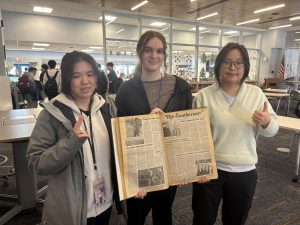They Just Want Justice — the Rise of Great Neck Protests
January 12, 2021
By Nate Cohen
On June 7 a crowd of protesters, hundreds-strong, gathered at Great Neck’s Grace Avenue park. After 8 minutes and 46 seconds of silence, the length of time officer Derek Chauvin knelt on George Floyd, the group departed the park for Middle Neck Road. Supplied with masks and signs, the group marched for nearly a mile and a half to the Village Green Park. This protest was not coordinated by a well established civil rights organization but by a group of Great Neck high school students equipped with nothing more than a social media account, a passion for justice, and a bit of determination.

It was late May when junior Lizzie Sokolova sent out their first Instagram story detailing plans to organize a peaceful protest in Great Neck in support of Black Lives Matter. Nearly a week had passed since the death of George Floyd, and social-justice-oriented Sokolova had spent much of it signing petitions and raising awareness of the injustice on social media. But Sokolova felt called to do more. They wanted to protest. “I was just sick of sitting there and not being able to do anything tangible,” Sokolova explained. And since the pandemic made traveling to New York City unviable, Sokolova decided to organize a protest right in Great Neck. As they spread their plans on social media, Sokolova quickly came into contact with three seniors from Great Neck North — Chelsea Cohen, Ellie Lampione, and Naomi Hazan. These young women shared Sokolova’s passion for justice, and soon after the success of the first protest, they agreed to collaborate on more events in the future.
Their first step was creating the Instagram account Great Neck Protests, which acted as a hub for information on future events. Equipped with a drive and a social media following, the group began organizing two events each month. This has now totaled over a dozen different events ranging from protests to small group discussions to vigils.

South High senior Kwasi Osei-Amankwa has also been an integral part of the student movement. “I wouldn’t call myself an organizer,” noted Osei-Amankwah. “What I do is writing, writing, writing.” From passionate Instagram posts to emotional speeches, Osei-Amankwah has spent the summer crafting dozens of written works. “My main goal for my writing is to spread peace and love,” he said.
Despite Great Neck Protests’ support of the Black Lives Matter movement, they are not affiliated with the organization. “I feel like a big misconception is that when you hear Black Lives Matter… a lot of people think, oh that’s an organization of the extreme left,” explained Osei-Amankwah. “But when we are in the streets chanting ‘Black Lives Matter,’ we are not funding the organization. ‘Black Lives Matter’ is also a statement. This phrase is really saying… we’re all equal together.”
While Great Neck Protests was founded to rally behind the cause of Black Lives Matter, in recent months the group has begun tackling other social justice issues. A quick scroll through their Instagram page will show announcements for events covering mental health, Islamophobia, and Indigenous crime awareness.
According to both Solovoka and Osei-Amankwah, their biggest hope for future events is to increase turnout.. “Ever since the first protest there has been no more than 20 to 25 people, which is incredibly disappointing,” Osei-Amankwah said. In an effort to accommodate those who can’t meet in-person, Great Neck Protests has moved some events online. “It’s really not a big commitment,” said Sokolova. “And if you can’t attend, then sign petitions, vote if you are able to, and don’t stop educating yourself.”
Although Great Neck Protests does not have a specific agenda, they hope that by raising awareness about social justice issues they will help make Great Neck a more inclusive town. As Osei-Amankwah put it, they are simply asking people to “be more loving and understanding about certain things that they do and say.”
“It’s not about politics,” said Sokolova, “it’s about human rights.”





